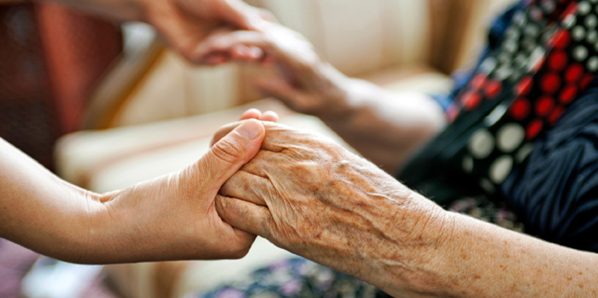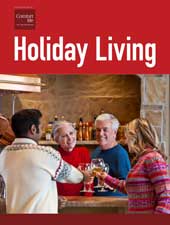Lessons Learned Through Homecare: A Daughter’s Love and Honour
Most Canadians would prefer to remain at home for as long as possible as they age, regardless of illness. Andrea Nathanson of Qualicare shares a beautiful story of one daughter who gave her ailing mother unconditional love, care and support at home during the toughest of times and the lessons she learned through helping them.
One of the great joys of running a homecare business is appreciating that every case is more than a case, it’s a journey; a story with characters, emotions and lessons to be learned. One of the most powerful stories I learned from happened a few years ago. I was privileged to see the depth of love that a daughter had for her mother. And I was privileged to be able to play a role in helping this love continue to blossom.
Ruth’s 80 year old mother Maria [not their real names] developed a debilitating and painful brain disease when she was visiting Toronto from Italy. Maria had been a vibrant and independent woman, a lawyer and women’s rights activist back home. And now she was in a wheel chair, in tremendous pain and completely dependent on Ruth.
If you're caring for an aging or ailing family member, you aren't alone. Read more about caregivers of aging parents in Caregivers of the Aging.
Ruth explained on our first meeting, “Mom frequently told me over the years that she never wanted to be institutionalized, no matter how ill she ever became. As her disease has progressed and new concerns have developed, it has become so difficult for her to get to see a doctor. She is in excruciating pain when we move her. So she has begun to refuse going to the doctor. And I can’t find a doctor to come and see her. I am exhausted. I don’t want to let her down, but I don’t know what to do for her anymore.”
That was why she contacted me. As I listened to her entire story, I was immediately struck by two things. The first was Maria’s absolute determination to maintain her dignity and independence, and the second was Ruth’s unwavering focus to meeting her mother’s wishes, no matter how hard that would be. My job was to make this happen, using our 360° Case Management approach.
It was agreed that my job would be to advocate and orchestrate the healthcare system for Maria and Ruth, which would be no simple task given Maria’s status as a visitor. My primary goal was to ensure the best healthcare for Maria, the least amount of stress for Ruth, and the most optimal support for the entire family. I often say that I function like a bridal consultant, taking care of the details, so the bride and her family can enjoy the wedding.
I realized that if Maria wouldn’t or couldn’t go out, we would have to set up her bedroom like a hospital, only in the most cozy and dignified way. She had a special hospital bed to help her frail skin, an over bed table and a commode chair. The family renovated her on suite bathroom so she could have a regular shower up until the time she could no longer have one. She had lovely furniture. The hospital bed was made to look as though she was in her regular bed, always with beautiful sheets and soft blankets. We never once put her in a hospital gown. One of our caregivers made her fancy night gowns that we could tie or button at the back.
Find out more about how to get the best out of Canada's home care in Home Health Care in Canada: Background and Advice.
Maria had lost a lot of weight by the time I was introduced to her. As well, she had painful bedsores. She was frequently carrying a urinary tract infection and had severe body aches and pain. We needed very strong people to lift her so I suggested we get a Hoyer lift in the home to make this easier on everyone (a Hoyer lift is a mechanical device like a sling that would go under Maria and lift her). “Absolutely not,” Ruth said, “My mother is NOT going to be swung around like a big sack of potatoes.” So we ended up having two people in the apartment at all times, in the event that Maria needed to get up. If her mother needed to use the washroom, she needed to use the washroom right then, not when it was a shift change when two people were there. Ruth was so intent on maintaining her mother’s dignity and would not deviate from that plan, not once, not ever.
We believe that we don’t just provide care for our clients, but for the entire family that cares about the client. To that end, it was vitally important to help Maria’s family members cope with Maria’s declining health. The end was going to be very difficult and sad, yet I explained that it’s normal and okay to be sad. I think it’s important for people to realize that tough times are temporary times. I wanted to make sure that Ruth had the opportunity to express how hard it was for her and not to put on a brave face all the time. I wanted her to know that it was wonderful that she was looking after her mother and that her life was committed to it, but in the end, I would say, ‘This excruciatingly painful time will be over one day. There will be a time when life will have a sense of normalcy again—it will be a new normal." When it was Ruth’s 50th birthday and she didn’t want to celebrate her birthday, I supported her understanding that it made good sense to not feel in a celebratory mood.
For a year and a half we looked after Maria at home, not going to a hospital, not even once. I feel tremendous pride that she maintained her dignity at all times. She always looked beautiful, she always smelled beautiful.
One of the Ten Commandments is “Honour Your Father and Mother.” The Hebrew word for honour is related to the word for ‘heavy’. In other words when the time comes, it is a Biblical commandment to carry the responsibility of looking after your father and mother. This should not feel like a heavy burden, but rather should be approached the way Ruth approached it—as an opportunity to give back to her mother, unconditionally.
My mission and purpose in life is to help people. Every single person that I get to know is considered a precious gift. They are my teachers on how to improve myself and be a better person. I closely watched Ruth, Maria and their entire family and the lessons that I learned are invaluable treasures that I have with me forever.
Learn about a charity that connects adult children of aging senior parents in Losing Our Parents: A Charity for Our Times.
About the Author
Andrea Nathanson is the Co-Founder of Qualicare Homecare and the Executive Director with primary responsibility for creating and maintaining Qualicare’s nurse-managed approach to homecare. A native of Vancouver, Andrea is a Registered Nurse, author and the main source of the unique energy that infuses Qualicare. She and her husband, Wayne, founded Qualicare in 2001 as a result of their difficult experiences caring for Wayne’s late father Nardy, who had ALS. They realized that there had to be a better way to help families cope with the multiple challenges of caring for loved ones. In 2011, they began to expand this approach across Canada and the US by creating Qualicare Franchise Corporation.
* * * * *
Do you have a story similar to Andrea's or Ruth's? Share your thoughts and experiences in the Comments section below!


